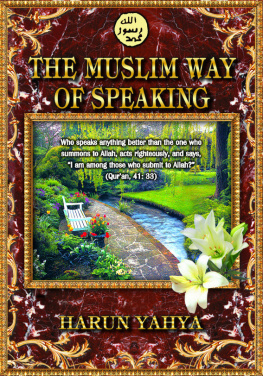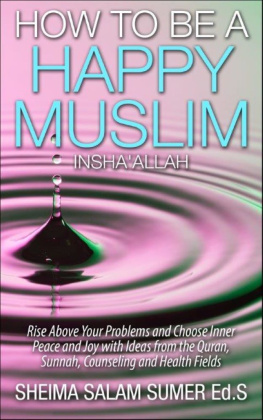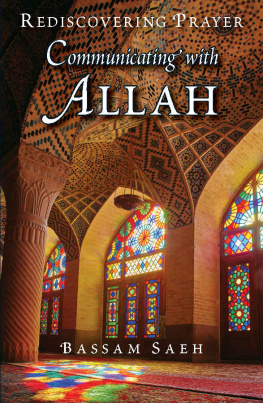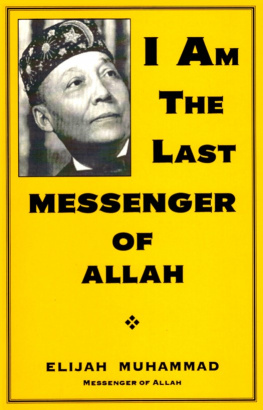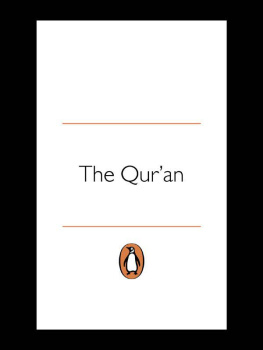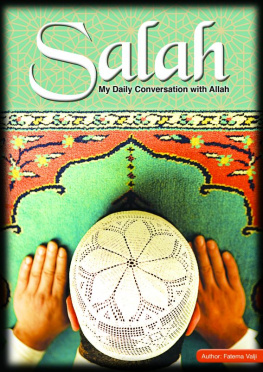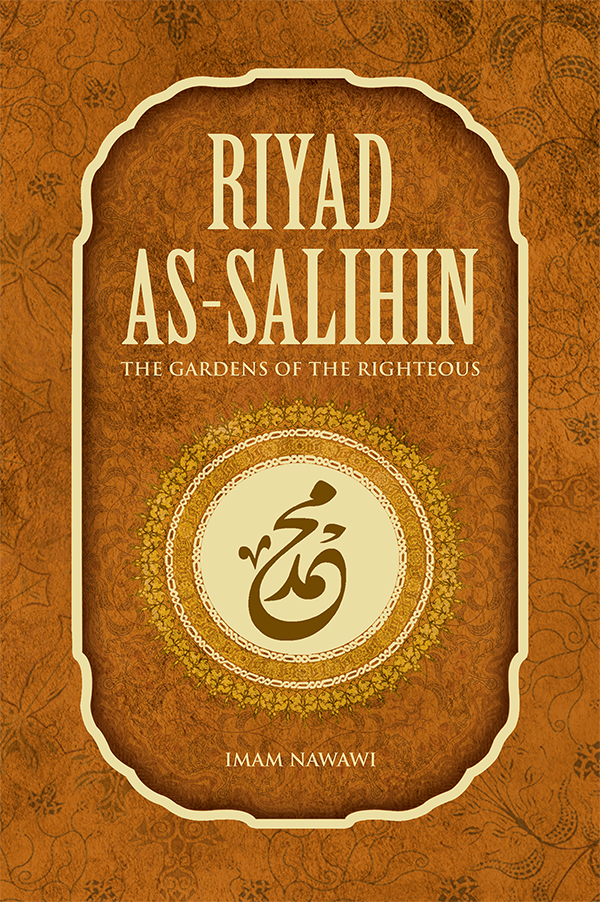Riyad as-Salihin
The Gardens of the RIghteous
Imam Nawawi

New Jersey
Copyright 2014 by Tughra Books
17 16 15 14 / 1 2 3 4
All rights reserved. No part of this book may be reproduced or transmitted in any form or by any means, electronic or mechanical, including photocopying, recording or by any information storage and retrieval system without permission in writing from the Publisher.
Published by Tughra Books
345 Clifton Ave., Clifton,
NJ, 07011, USA
www.tughrabooks.com
Library of Congress Cataloging-in-Publication Data Available
Epub
Ahmet Kahramanoglu
DIJITAL ISBN: 978-1-59784-680-6
Printed by
alayan A.., Izmir - Turkey
Introduction
R iyad as-Salihin (The Gardens of the Righteous), is one of the most famous works of Imam Nawawi. The authors real name is Muhyiddin Abu Zakariyya Yahya ibn Sharaf ibn Murri (12331277 CE ). He is a great scholar of Hadith whose opinions are accepted as proof in his field. This work of Imam Nawawi has become so famous that it is commonly found in most Muslims homes. In this compilation, along with taking the prime Hadith references known as the Six Books ( Al-Kutub as-Sitta ) as basis, he benefited from other sources as well. He related authenticated hadith s with their sources, and took the relevant verses of the Quran at the beginning of every chapter. The hadith s he preferred to include his collection are about:
a.Enhancing morality
b.Purifying hearts
c.Protecting body parts from sin
d.Being a means for happiness in this world and the next
e.Encouraging for goodness, warning against evil, and revealing the outward and inward manners of journeying on the spiritual path
f.Enjoining the good and forbidding the evil
Thus, Riyad as-Salihin can be briefly defined as a book of enhancing morals, mannerliness, encouraging goodness, and warning against the evil. This work consists of the wisdom of the noble Prophet setting the criteria about the manners to be observed by individuals.
Since the time it was published, Riyad as-Salihin has been a must read on the way to deepening in Islamic teaching.
This work we present to you with pride is an abridged version of the full compilation. This abridged version consists of 876 hadith s chosen from among more than 1800 hadith s on 18 main topics. There are so many different annotated versions of this classic. In our version, we rather tried to translate the intended meaning to be derived from the hadith s, rather than making a word for word translation. Annotations are added to clarify the meaning when needed. The Quranic verses and hadith s are presented with their sources. Rather than the entire chain of narration, name of the particular Companion who reported a given hadith is stated at the beginning. We pray Allah that it serves as an encouragement to goodness and benefits people.

In the Name of Allah, the All-Merciful,
the All-Compassionate
Sincerity and Purity
of Intention
But they were not enjoined anything other than that they should worship Allah, sincere in faith in Him and practicing the Religion purely for His sake, as people of pure faith; and establish the Prayer in accordance with its conditions; and pay the Prescribed Purifying Alms, and that is the upright, ever-true Religion. (al-Bayyinah 98:5)
(Bear in mind that) neither their flesh nor their blood reaches Allah, but only piety and consciousness of Allah reach Him from you (al-Hajj 22:37)
Say (to the believers): Whether you keep secret what is in your bosoms or reveal it, Allah knows it. He knows whatever is in the heavens and whatever is on the earth. Allah has full power over everything. (Al Imran 3:29)
:
Umar ibn al-Khattab, may Allah be pleased with him , said, I heard the Messenger of Allah, peace and blessings be upon him , say, Indeed, actions only go by intentions. Everyone gets what they intend. Anyone, therefore, who emigrates to Allah and His Messenger, his emigration is indeed to Allah and His Messenger. But anyone who emigrates to gain something of this world or to marry a woman, his emigration is to that to which he emigrated. (Sahih al-Bukhari, Iman, 41; Sahih Muslim, Imara, 155).
Aisha, may Allah be pleased with her, Umm al-Muminin (the Mother of the Believers), The Messenger of Allah, peace and blessings be upon him , said, An army will invade the Kaba. When they are at Bayda, the earth will swallow them up from the first to the last of them. She said, I said, O Messenger of Allah, how will it swallow them up from the first to the last of them when their traders are among them as well as others who are not really part of them? He said, It will swallow them up from the first to the last of them and then they will resurrected according to their intentions. (Sahih al-Bukhari, Hajj, 49; Sahih Muslim, Fitan, 4).
Aisha, may Allah be pleased with her, said, The Prophet, peace and blessings be upon him , said, There is no more hijra after the Conquest (of Mecca), but there is jihad (striving in Allahs cause and for humanitys good) and intention. When you are called to it then go. (Sahih al-Bukhari, Jihad, 1; Sahih Muslim, Hajj, 445).
: : :
Jabir ibn Abdullah al-Ansari, may Allah be pleased with him , said, Once we were with the Prophet, peace and blessings be upon him , on an expedition and he said, There are certain men still in Medina who have accompanied you on every stretch you have travelled and every valley you have crossed. It was only illness that prevented them from coming. One variant has, from their sharing the reward with us. (Sahih Muslim, Imara, 159).
: : : : : : : : : .
Sad ibn Abi Waqqas, may Allah be pleased with him , said, The Messenger of Allah, peace and blessings be upon him , visited me in the year of the Hajj of Farewell on account of a serious illness I had. I said, O Messenger of Allah, this illness has affected me as you see and I have property but no heirs other than my daughter. Shall I give two-thirds of my property away as sadaqa (alms) ? He replied, No. I asked, A half? He replied, No. He said, A third, and a third is great (or a lot). It is better to leave rich heirs than to leave them poor, begging from other people. There is nothing you spend, desiring by it the face of Allah, but that you will be rewarded, even for a morsel you put in your wifes mouth. I said, O Messenger of Allah, will I be left behind (in Mecca) after my Companions leave? He said, You will not be left behind, for any virtuous actions you do will raise you in degree and elevation. Then perhaps you might be left behind so that some people will benefit from you and others be harmed by you. O Allah, let my Companions complete their emigration and do not let them turn back on their heels, but poor Sad ibn Khawla had the Messenger of Allah grieve over his death in Mecca. (Sahih al-Bukhari, Wasaya, 2, Faraid, 6; Sahih Muslim, Wasiyya, 5).
: :
Abu Hurayra Abdur-Rahman ibn Sakhr said that the Messenger of Allah, peace and blessings be upon him , said, Allah does not look at your bodies nor your forms but He looks at your hearts and your actions. (Sahih Muslim, Birr, 33).
: :
Abu Musa al-Ashari, may Allah be pleased with him , said, The Messenger of Allah, peace and blessings be upon him , was asked about the man who fights in anger, a man who fights to defend himself and a man who fights to show off, and whether any of these were fighting in the path of Allah. The Messenger of Allah, peace and blessings be upon him , said, The one strives so that the Word of Allah will be uppermost is in the path of Allah. (Sahih al-Bukhari, Ilm, 45, Jihad, 15, Tawhid 28; Sahih Muslim, Imara, 150, 151).



![an-Nawawi - The Book of Remembrances [Kitab al-Adhkar]](/uploads/posts/book/371945/thumbs/an-nawawi-the-book-of-remembrances-kitab.jpg)

